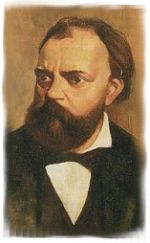Antonin Dvorak

|
With many misgivings, Dvorak’s father enrolled him in the Prague Organ School. At this specialized school, Dvorak received strict training in church music. Though Dvorak enjoyed this training, he enjoyed even more attending the concerts gives by contemporary composers such as Wagner and Schumann. After graduation from the Prague Organ School in 1859, Dvorak joined the Provisional Theatre Orchestra as the head violinist. Though this was a steady job Dvorak needed more income. So Dvorak took up teaching which left him with limited free time. This limited free time did not make Dvorak happy so in 1871 he gave up the orchestra to compose full time. With this extra time, Dvorak found time to date and marry Anna Cermakova in 1873. The next year in 1874, Dvorak entered no fewer than fifteen works including his Third Symphony into the Austrian National Prize. Dvorak won and received a much needed cash prize, but more importantly he won the respect of Brahms who was one of the judges for the contest. With this new found friendship, Dvorak was put in touch with Brahms’ publisher Simrock. Simrock commissioned the first set of Slavonic Dances in 1878. These melodies would be played for years to come across the world. From these tunes, Dvorak’s fame escalated. In 1884 Dvorak began to travel widely. In 1884 he took his first of nine visits to London. Many of what are considered his greatest works, such as his Seventh and Eighth Symphonies were composed in London. Dvorak’s Seventh Symphony, often regarded as his best, powerfully tells of a mood of tragedy overlaid with ominous and foreboding overtones. The Eighth Symphony is a great contrast to the Seventh, using folk melodies and colorful orchestration. 
In 1891, Dvorak was appointed professor of composition at the Prague Conservatoire. He soon left this position to take up the offer of the position of Directorship of the National Conservatory of Music in New York. He stayed there three years, spending all holidays in Spillville, a Czech-speaking community in Iowa. This period in America brought inspiration to write some of this best loved music Symphony Number Nine From the New World and American String Quartet. Both of these works made use of themes influenced by American Indian folk melodies and Negro Spirituals. Dvorak would later admit that he chose to be influenced because of his homesickness in America. Though homesick, in 1895 just before leaving America, he produced his most remarkable symphonic work Cello Concerto. Returning to Prague with great relief, Dvorak resumed his position at the Prague Conservatoire, and in 1901 became the director. For three years he devoted his creative energies to working on symphonic poems and operas. Dvorak died from a short illness in 1904 at the age of sixty-two. He is buried in Prague at the beautifully manicured cemetery at Vysehrad. What made Dvorak so special is that he was able to take folk tradition that people see everyday yet do not notice and turn it into music that people would listen to and enjoy. This was a difficult task considering the music of the time was classical and not all the folk traditions he borrowed from readily lent themselves to that. The effort that it took to accomplish this is what has helped his music stand the test of time. 
Listen : New World Symphony Movement 1 (Antonin Dvorak) [MIDI] Listen : New World Symphony Movement 1 (Antonin Dvorak) [MIDI] Listen : New World Symphony Movement 1 (Antonin Dvorak) [MIDI] Listen : New World Symphony Movement 1 (Antonin Dvorak) [MIDI] Dvorák wrote nine symphonies of which the best known is the Symphony n. 9, "From the New World", written in 1893 and first performed in New York in the same year. |
Other famous people & artists
Bedrich Smetana
Back